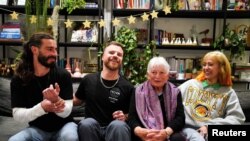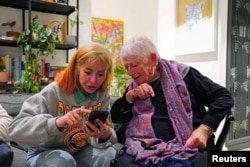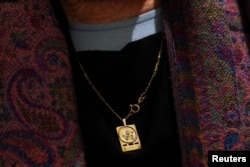As a child, Sarah Jackson survived the Nazi Holocaust. On Oct. 7 last year, she foundherself sheltering three Israelis fleeing the deadliest attack on Jews since World War Two.
Jackson said the events, which triggered Israel's military offensive in Gaza, had all happened very quickly. "I live second house to the gate (kibbutz entrance). I see some people on the road... And those lovely people came into my house," she said.
"They went to the front door, they locked the door and I have a very big armchair in the corner and they put the armchair to the door, and we all went into the shelter."
Ilya Pisatzkov, 34, was one of those who joined her.
"The gunshots were coming from everywhere," she said. "We jumped to the car, started driving. When we started driving we
saw a grenade which fell literally several meters from us, it was all in smoke, and, and we drove away."
Pisatzkov and his friends managed to drive about two km (1.2
miles) to nearby Kibbutz Sa'ad. Passing bodies strewn along the
road, they managed to evade Hamas ambushes. A total of 1,200
people, mostly civilians, were killed on October 7.
Nearly four months on, the four met again, smiles and hugs as they looked at selfies from that day in Jackson's shelter. "You're the one who fell asleep in my bed, right?" she asked Benel Fransis, one of the three.
Commemorating The Holocaust
The emotional reunion started with 88-year-old Jackson recounting her experiences of loss, hiding and perseverance while growing up as a Jewish child in wartime Poland and Siberia.
She was four years old when the war started. Her family sought hiding in Siberia and after years of displacement and hearing that relatives perished in the Holocaust, her parents decided to immigrate to Israel in 1949.
Jackson gave her testimony as part of an Israeli grassroots initiative of informal gatherings in people's private homes to commemorate the Holocaust.
The event, titled 'Zikaron Basalon' (Remembrance in the Living Room), brings together Holocaust survivors or descendants of survivors who share their accounts with younger people. For some survivors, Hamas' attack recalled past atrocities. Adding to their distress, antisemitism has been on the rise as Israel presses on with its war in Gaza, where it has vowed to eliminate Hamas and more than 25,700 Palestinian have been killed.
"I couldn't believe it's happening again," said Jackson. It's very hard for me."
Nonetheless, Jackson is hopeful better times will come to the region.
"You can come to agreements without war," she said. "I hope
that people will learn to, if they want to change, it's possible, to change without war, don't you think so?"



Forum